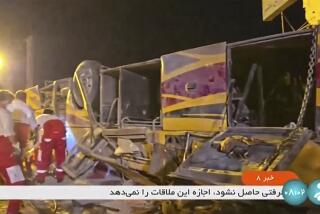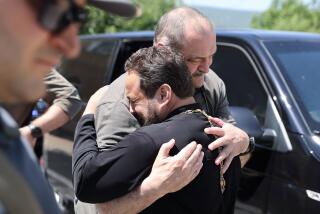Bombs target Shiite pilgrims
- Share via
BAGHDAD — Attacks targeting Shiite pilgrims bound for the holy city of Karbala rocked Baghdad on Wednesday, leaving 20 dead and more than 60 injured, government officials said.
The attacks ended a monthlong lull in violence that accompanied Iraq’s parliamentary elections, when security was at an all-time high in the capital. The bloodshed also appeared to be timed to the climax of an annual 40-day period of mourning for Shiite Muslim faithful, a period in which Sunni Arab insurgent attacks had become commonplace in the years after the 2003 U.S.-led invasion of Iraq.
The deadliest incident occurred at a busy bus terminal in Bayaa, in southern Baghdad, when two car bombs exploded, killing 18 and injuring 50. The bombs had been planted in parked cars near buses bound for Karbala, according to police and witnesses.
Ammar Hussein, 25, said he and a friend had just arrived at the station looking for a mini- bus to Karbala. Suddenly, he heard a loud explosion and everything around him turned black.
“I lost consciousness, and when I woke up I saw that my left leg was bleeding,” Hussein said. “I was taken to a hospital and was crying the whole time because I don’t know what happened to my friend.”
Hussein said he could not understand why he and other pilgrims were attacked.
“What did I do to deserve this?” he said. “This is the doing of those who are cowardly and low.”
Earlier in the day, a roadside bomb exploded in the northern Waziriya neighborhood, killing two Shiite pilgrims and injuring a dozen people. Six of the injured were riding past the scene in a bus when the bomb detonated.
Thousands of pilgrims from throughout Iraq walk or drive to Karbala to mark Arbaeen, the end of a 40-day mourning period for Imam Hussein, grandson of the prophet Muhammad. Karbala is roughly 50 miles south of Baghdad, and streets leading in and out of the capital have been choked by throngs of pilgrims. In past years, Sunni Muslim insurgents have carried out attacks on Shiite pilgrims and religious sites.
Wednesday’s attacks also corresponded with a rotation of U.S. troops in Baghdad. Throughout Iraq, terrorists have often stepped up attacks during such periods of transition.
At a transfer of authority ceremony at Camp Liberty in Baghdad on Tuesday, the 1st Cavalry Division took over responsibility for the Baghdad area of operations from the 4th Infantry Division. The ceremony marked the third time the two Army units, based at Ft. Hood, Texas, have transferred control of the Baghdad area to each other.
Over the last 12 months, the 4th Infantry Division saw an 80% drop in the frequency of attacks against civilians in Baghdad and surrounding areas, said Army Lt. Gen. Lloyd Austin III, commanding general of the Multinational Corps in Iraq.
Elsewhere Wednesday, Iraqi Prime Minister Nouri Maliki received a special delegation from Iran, signaling closer ties between the two countries, which fought a war in the 1980s.
Maliki said talks with Iranian Foreign Minister Manouchehr Mottaki were aimed at improving political, economic, trade and defense relations with Iran.
In particular, Maliki noted that Iraq is experiencing drought-related problems and that he hoped the two nations could work together on that issue.
A statement from Maliki’s press office said that Mottaki congratulated Iraq on the success of its recent parliamentary elections.
--
More to Read
Sign up for Essential California
The most important California stories and recommendations in your inbox every morning.
You may occasionally receive promotional content from the Los Angeles Times.











